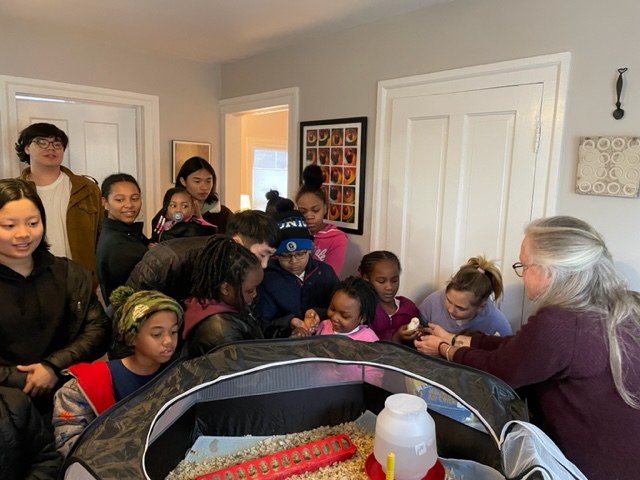
In Spring 2023, a chicken-keeping course for Middletown residents taught by Amy Grillo, associate professor of the practice in the Allbritton Center for Public Study and Environmental Studies, was held at the College of the Environment. The Chickens 101 project was started by Diana Martinez, assistant director of the Jewett Center for Community Partnerships, along with Lorenzo Jones, co-founder and co-executive director of the Katal Center for Equity, Health and Justice, as part of the Jewett Center for Community Partnerships’ Cultivating Justice initiative. Jones is the Jewett Center’s Re-Imagining Justice Mentor-in-Residence this year.
Cultivating Justice kicked off with the Growing Power conference, which sought to connect or reconnect families and young people—specifically BIPOC, incarceration-impacted, and low-income families—to agriculture, ancestral relationships with nature, and skills that promote food security, intergenerational relationship building, and wellness.
The eight local families who were chosen to participate in the program each received five chicks, chicken-keeping supplies, and a series of informational classes taught by Grillo, a seasoned chickenkeeper who is not only a home farmer, but also an avid advocate for equity in farming, especially in Middletown. “In the state of Connecticut, less than one percent of all farmers are people of color or women,” said Grillo, something she hopes courses like Chickens 101 will help change.
Grillo has been raising chickens for more than a decade. I went over to her home to see her flock, many of which she hatched using an incubator. The day I visited, a fairly large pen with about 15 chicks chirping and running around was stationed on a large table; a bowl near the stove held eggs of all different shades and sizes, produced by her full-grown chickens, which live outside. “Raising chickens is a great entry point into being more self-sufficient,” says Grillo.
The point of the chicken-keeping program was not only to get participants excited about the chickens, but also to build community around producing their own food. “Cultivating Justice is working at the intersection of race, equity, and agriculture, and working to bridge gaps that disconnect people, particularly people of color, from nature, agriculture, and ultimately each other,” said Martinez. “Our Backyard Chicken Keeping Course is an example of Wesleyan leveraging its resources, human and capital, in support of community access, learning, and equity.”
During a course discussion I attended, participants talked about everything from their new chicken obsessions, healthier diets, and racism in agriculture and food to their relationships to the land and self-sufficiency.
“I’m tired of going to the grocery store,” remarked one participant, noting the high prices and low quality of store-bought produce and eggs. However, not everyone was on board immediately.
“At first I wasn’t really with it,” admitted another participant. “But now, everything in my life is chickens—we are turning our house into a kind of farm!” he shared.
“Cultivating Justice is seeking broad support from Wesleyan partners to further our mission and goals. We tell the youth we work with that agriculture is an interdisciplinary field. We need, and can find ways to incorporate, artists, engineers, scientists, social scientists, and activists into our work,” says Martinez. “If you are interested in growing community (and cucumbers) with us, please reach out!”





